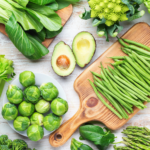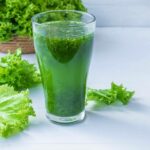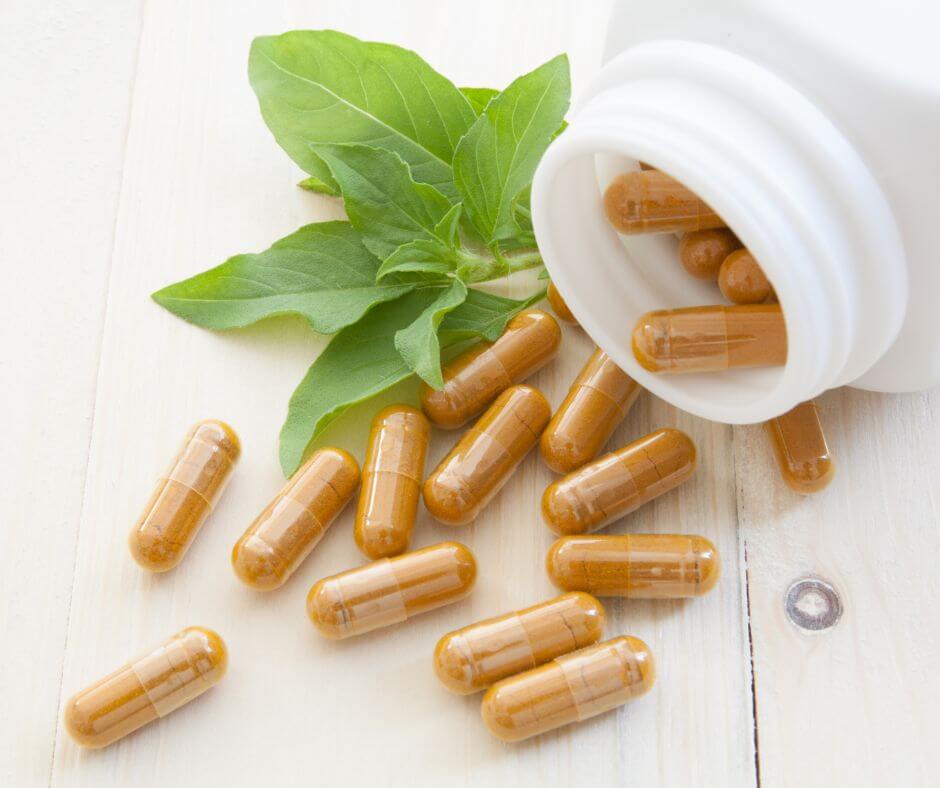Do you know what vegetables are good for the skin? Eating a healthy diet is not only beneficial for our overall health but also for our skin. Vegetables are a great source of vitamins, minerals, and antioxidants that help nourish our skin from within. This blog will discuss seven skin-boosting vegetables you should consider adding to your diet for a glowing complexion.
The value of a good diet for skin health

A healthy diet plays a vital role in maintaining healthy skin. The food that we eat provides the essential vitamins, minerals, and nutrients that our skin needs to function correctly. Without the right nutrients, our skin can become dull, dry, and prone to acne and other skin problems.
One of the key benefits of a healthy diet for skin health is that it can help to protect our skin from damage caused by free radicals. Free radicals are unstable molecules that can cause damage to cells, including those in our skin. This damage can lead to premature aging, wrinkles, and other signs of skin aging
Eating a diet rich in fruits, vegetables, whole grains, and lean proteins can help to provide our skin with the nutrients it needs to repair itself and maintain a healthy appearance. For example, vitamin C, which is found in many fruits and vegetables, can help to boost collagen production, which is essential for maintaining skin elasticity and firmness.
In addition to providing essential nutrients, a healthy diet can also help to reduce inflammation in the body, which can contribute to skin problems such as acne and rosacea. Eating a diet rich in anti-inflammatory foods, such as leafy greens and fatty fish, can help to reduce inflammation and improve overall skin health.
Overview of skin-boosting vegetables

There are many vegetables that are great for skin health, and incorporating them into your diet can help to promote a healthy, glowing complexion. Some of the top skin-boosting vegetables include:
Spinach – Spinach is rich in vitamins A and C, which are important for maintaining healthy skin. Vitamin A helps to reduce inflammation and improve skin tone, while vitamin C is essential for collagen production and skin repair.
Carrots – Carrots are a good source of beta-carotene, which is converted into vitamin A in the body. This vitamin is important for skin health, as it helps to reduce inflammation, improve skin tone, and protect against sun damage.
Sweet potatoes – Sweet potatoes are also a great source of beta-carotene, as well as vitamin C and vitamin E. These nutrients help to protect the skin from damage and promote a healthy, radiant complexion.
Tomatoes – Tomatoes are rich in lycopene, an antioxidant that helps to protect the skin from sun damage and reduce inflammation. They also contain vitamin C, which is important for collagen production and skin repair.
Bell peppers – Bell peppers are a good source of vitamin C and antioxidants, which help to protect the skin from damage and reduce inflammation. They also contain vitamin E, which helps to nourish and hydrate the skin.
Broccoli – Broccoli is rich in vitamins A and C, as well as antioxidants that help to protect the skin from damage and reduce inflammation. It also contains sulforaphane, a compound that has been shown to have anti-aging benefits for the skin.
Kale – Kale is a superfood that is packed with vitamins A, C, and K, as well as antioxidants that help to protect the skin from damage and reduce inflammation. It also contains iron, which is important for healthy blood flow and skin cell renewal.
Nutritional benefits of spinach for skin health

Spinach is a leafy green vegetable that is packed with nutrients that are essential for healthy skin. Here are some of the nutritional benefits of spinach for skin health:
Vitamins A and C:
Spinach is rich in vitamins A and C, which are important for maintaining healthy skin. Vitamin A helps to reduce inflammation and improve skin tone, while vitamin C is essential for collagen production and skin repair.
Iron:
Spinach is also a good source of iron, which is important for healthy blood flow and skin cell renewal. Iron deficiency can lead to a pale, dull complexion and may contribute to the development of dark under-eye circles.
Antioxidants:
Beta-carotene, lutein, and zeaxanthin are among the antioxidants found in spinach. These antioxidants help to protect the skin from damage caused by free radicals, which can lead to premature aging, wrinkles, and other signs of skin aging.
Hydration:
Spinach is also rich in water, essential for maintaining skin hydration and preventing dryness. When the skin is dehydrated, it can appear dull and may be more prone to wrinkles and fine lines.
How to incorporate spinach into your diet

Incorporating spinach into your diet is easy and delicious! Here are some simple ways to add this nutritious leafy green to your meals:
Salads:
Spinach makes a great base for salads and can be paired with a variety of other vegetables, fruits, and proteins. Try topping your spinach salad with grilled chicken, sliced strawberries, and feta cheese for a delicious and nutritious meal.
Smoothies:
Spinach is a great addition to smoothies, as it adds nutrients without altering the flavor too much. Blend spinach with frozen berries, almond milk, and a scoop of protein powder for a healthy and satisfying breakfast or snack.
Omelets:
Spinach is also delicious in omelets or scrambled eggs. Sauté a handful of spinach with garlic and onions, then add beaten eggs and cook until set for a nutritious and satisfying breakfast.
Wraps:
Use spinach leaves as a wrap for your favorite sandwich or wrap filling. This is a great way to add extra veggies to your meal and cut back on refined carbs.
Soups and stews:
Add spinach to your favorite soups and stews for a boost of nutrients and flavor. Spinach works well in vegetable soups, lentil stews, and chicken noodle soup.
Nutritional benefits of carrots for skin health

Carrots are root vegetable that are packed with nutrients that are essential for healthy skin. Here are some of the nutritional benefits of carrots for skin health:
Beta-carotene:
Carrots are rich in beta-carotene, a pigment that is converted into vitamin A in the body. Vitamin A is important for skin health, as it helps to reduce inflammation, improve skin tone, and protect against sun damage.
Vitamin C:
Carrots are also a good vitamin C source, essential for collagen production and skin repair. Powerful anti-oxidants like vitamin C work to shield the skin from free radical damage, which can speed up the ageing process and cause wrinkles.
Potassium:
Carrots are a good source of potassium, which is important for maintaining skin hydration and preventing dryness. Potassium helps to regulate the balance of fluids in the body, which can help to reduce puffiness and promote a healthy, glowing complexion.
Fiber:
Carrots are also a good source of fiber, which is important for healthy digestion and elimination. When the digestive system is working properly, the body can absorb and utilize the nutrients essential for healthy skin.
Water:
Carrots are also rich in water, essential for maintaining skin hydration and preventing dryness. When the skin is dehydrated, it can appear dull and may be more prone to wrinkles and fine lines.
How to incorporate carrots into your diet

Including carrots in your diet is simple and delectable. Here are some simple ways to add this nutritious root vegetable to your meals:
Raw:
One of the easiest ways to eat carrots is to eat them raw as a snack. Cut them into sticks and pair them with hummus, peanut butter, or your favorite dip.
Salads:
Carrots make a great addition to salads. Grate them or cut them into matchsticks and toss them with your favorite greens, nuts, and a simple dressing.
Soups and stews:
Carrots are a common ingredient in soups and stews, and add a delicious sweetness to the dish. Add them to your favorite vegetable or chicken soup for extra flavor and nutrition.
Roasted:
Carrots can be roasted to enhance their inherent sweetness. Toss them with olive oil and spices, such as cumin or paprika, and roast them in the oven until tender and caramelized.
Juicing:
Carrots are a great addition to fresh juice. Combine them with other fruits and vegetables, such as apples, celery, and ginger, for a delicious and nutritious drink.
Nutritional benefits of sweet potatoes for skin health

Sweet potatoes are root vegetable that are packed with nutrients that are essential for healthy skin. Here are some of the nutritional benefits of sweet potatoes for skin health:
Beta-carotene:
Like carrots, sweet potatoes are rich in beta-carotene, which is converted to vitamin A in the body. Vitamin A is essential for healthy skin as it promotes cell turnover, which helps to keep the skin looking youthful and radiant. It also helps to reduce inflammation and protect against UV damage.
Vitamin C:
Sweet potatoes are also a great source of vitamin C, which is an antioxidant that helps to protect the skin from free radicals that can cause premature aging. Vitamin C also helps to promote collagen synthesis, which is essential for healthy, firm skin.
Fiber:
Sweet potatoes are a good source of fiber, which is vital for healthy digestion and elimination. Good digestion and elimination are key to maintaining healthy, clear skin.
Potassium:
Sweet potatoes are a good source of potassium, which is important for maintaining skin hydration and preventing dryness. Potassium helps to regulate the balance of fluids in the body, which can help to reduce puffiness and promote a healthy, glowing complexion.
Vitamin E:
Sweet potatoes are also a good source of vitamin E, which is an antioxidant that helps to protect the skin from oxidative stress. Vitamin E also helps to promote healthy skin cell growth and repair.
The best way to include sweet potatoes in your diet

Sweet potatoes are a versatile and delicious ingredient that can be incorporated into a variety of dishes. Here are some easy ways to add sweet potatoes to your diet:
Baked sweet potato:
Simply bake a sweet potato in the oven until tender, and enjoy it as a side dish or a healthy snack. You can top it with a dollop of Greek yogurt, some cinnamon, or a sprinkle of chopped nuts for added flavor and nutrition.
Sweet potato fries:
Cut sweet potatoes into thin wedges, toss them with olive oil and spices, and roast them in the oven for a healthier version of French fries. They are a great side dish or a tasty snack.
Sweet potato mash:
Boil sweet potatoes until they are tender, mash them with some milk or butter, and season with salt and pepper for a delicious and healthy side dish.
Sweet potato soup:
Make a creamy and comforting soup by simmering sweet potatoes with vegetable broth and aromatics like garlic and onion. Add a touch of cream or coconut milk for extra richness.
Sweet potato curry:
Make a fragrant curry by sautéing diced sweet potatoes with your favorite vegetables and curry paste, then adding coconut milk and simmering until tender.
Nutritional benefits of tomatoes for skin health

Tomatoes are a rich source of vitamins and antioxidants that offer a wide range of benefits for skin health. Here are some of the nutritional benefits of tomatoes for skin health:
Lycopene:
Tomatoes are a rich source of lycopene, which is an antioxidant that helps to protect the skin from sun damage and premature aging. Lycopene also helps to promote healthy collagen production, which is essential for healthy, firm skin.
Vitamin C:
Tomatoes are also a good source of vitamin C, which is an antioxidant that helps to protect the skin from free radicals that can cause damage and premature aging. Vitamin C also helps to promote collagen production, which is essential for healthy, firm skin.
Potassium:
Tomatoes are a good source of potassium, which helps to regulate the balance of fluids in the body, which can help to reduce puffiness and promote a healthy, glowing complexion.
Vitamin A:
Tomatoes are also a good source of vitamin A, which promotes healthy skin cell turnover and can help to reduce inflammation.
Fiber:
Tomatoes are a good source of fiber, which is vital for healthy digestion and elimination. Good digestion and elimination are key to maintaining healthy, clear skin.
How to incorporate tomatoes into your diet

Tomatoes are a versatile and tasty ingredient that can be added to a variety of dishes. Here are some simple ways to incorporate tomatoes into your diet:
Fresh tomato salad:
Make a simple salad by slicing fresh tomatoes and pairing them with fresh herbs like basil or parsley, and drizzling them with olive oil and balsamic vinegar.
Tomato sauce:
Make a healthy tomato sauce by sautéing garlic and onions in olive oil, adding canned tomatoes, and simmering until thickened. Use as a sauce for pasta or as a base for pizza.
Tomato soup:
Make a comforting tomato soup by sautéing onions and garlic in olive oil, adding canned tomatoes and vegetable broth, and simmering until the flavors meld together.
Tomato salsa:
Make a fresh and flavorful salsa by dicing tomatoes, onions, and jalapeños, and mixing them together with lime juice and salt. Serve with chips or use as a topping for tacos or grilled meats.
Stuffed tomatoes:
To remove the seeds and pulp, trim the tomatoes’ tops. Stuff the tomatoes with a mixture of cooked rice, herbs, and other vegetables, and bake until tender.
Nutritional benefits of bell peppers for skin health

Bell peppers are packed with nutrients that are essential for healthy skin. Here are some of the nutritional benefits of bell peppers for skin health:
Vitamin C:
Bell peppers are an excellent source of vitamin C, which is an antioxidant that helps to protect the skin from damage caused by free radicals. Vitamin C also helps to promote collagen production, which is important for maintaining healthy, firm skin.
Vitamin A:
Bell peppers are also a good source of vitamin A, which is vital for healthy skin cell turnover and can help to reduce inflammation.
Beta-carotene:
Bell peppers contain beta-carotene, which is a type of antioxidant that can help to protect the skin from sun damage and premature aging.
Water:
Bell peppers are high in water content, which helps to keep the skin hydrated and healthy.
Fiber:
Bell peppers are also a good source of fiber, which is vital for healthy digestion and elimination. Good digestion and elimination are key to maintaining healthy, clear skin.
The best way to include bell peppers in your diet

Bell peppers are a versatile and colorful ingredient that can be used in a variety of dishes. Here are some simple ways to incorporate bell peppers into your diet:
Stir-fry:
Add sliced bell peppers to your favorite stir-fry recipe for a colorful and nutritious addition. Bell peppers pair well with chicken, beef, shrimp, or tofu.
Salad:
Add diced bell peppers to your favorite salad for a crunchy and colorful addition. Bell peppers pair well with greens like spinach, romaine, or arugula.
Fajitas:
Slice bell peppers and onions and sauté them with your favorite protein for a delicious and healthy fajita filling. Serve with whole-grain tortillas and salsa.
Stuffed bell peppers:
Cut the tops off of bell peppers and remove the seeds and membranes. Stuff the peppers with a mixture of cooked rice, ground beef, or turkey, and spices, and bake until tender.
Snack:
Slice bell peppers into strips and serve with hummus or guacamole for a healthy and satisfying snack.
Nutritional benefits of broccoli for skin health

Broccoli is a nutrient-rich vegetable that is great for promoting healthy skin. Here are some of the nutritional benefits of broccoli for skin health:
Vitamin C:
Broccoli is an excellent source of vitamin C, which is an antioxidant that helps to protect the skin from damage caused by free radicals. Vitamin C also helps to promote collagen production, which is important for maintaining healthy, firm skin.
Vitamin A:
Broccoli is also a good source of vitamin A, which is vital for healthy skin cell turnover and can help to reduce inflammation.
Vitamin K:
Broccoli is high in vitamin K, which can help to reduce the appearance of dark circles and puffiness around the eyes.
Sulforaphane:
Broccoli contains sulforaphane, which is a compound that has been shown to have anti-inflammatory and anti-aging effects on the skin.
Fiber:
Broccoli is a good source of fiber, which is vital for healthy digestion and elimination. Good digestion and elimination are key to maintaining healthy, clear skin.
How to incorporate broccoli into your diet

A versatile vegetable, broccoli may be utilized in many different recipes. Here are some simple ways to incorporate broccoli into your diet:
Roasted:
Toss broccoli florets with olive oil, salt, and pepper, and roast in the oven until tender and slightly browned. Roasting brings out the natural sweetness of broccoli and gives it a delicious, nutty flavor.
Stir-fry:
Add sliced broccoli to your favorite stir-fry recipe for a colorful and nutritious addition. Broccoli pairs well with chicken, beef, shrimp, or tofu.
Salad:
Add chopped broccoli to your favorite salad for a crunchy and nutritious addition. Broccoli pairs well with other vegetables like tomatoes, bell peppers, and carrots.
Soup:
Add chopped broccoli to your favorite soup recipe for a nutritious and filling addition. Broccoli works well in creamy soups or brothy soups.
Snack:
Cut broccoli into bite-sized florets and serve with hummus or your favorite dip for a healthy and satisfying snack.
Nutritional benefits of kale for skin health

Kale is a nutrient-dense vegetable that is packed with vitamins and minerals that are great for promoting healthy skin. Here are some of the nutritional benefits of kale for skin health:
Vitamin C:
Kale is an excellent source of vitamin C, which is an antioxidant that helps to protect the skin from damage caused by free radicals. Vitamin C also helps to promote collagen production, which is important for maintaining healthy, firm skin.
Vitamin A:
Kale is also a good source of vitamin A, which is vital for healthy skin cell turnover and can help to reduce inflammation.
Vitamin K:
Kale is high in vitamin K, which can help to reduce the appearance of dark circles and puffiness around the eyes.
Iron:
Kale is a good source of iron, which is important for healthy blood circulation. Good circulation is key to delivering oxygen and nutrients to the skin cells, which can help to promote healthy, glowing skin.
Antioxidants:
Kale is packed with antioxidants, including flavonoids and carotenoids, which help to protect the skin from damage caused by free radicals.
How to incorporate kale into your diet

Kale is a versatile vegetable that can be used in a variety of dishes. Here are some simple ways to incorporate kale into your diet:
Smoothies:
Add a handful of kale to your morning smoothie for a nutritious and delicious boost. Kale pairs well with fruits like bananas, strawberries, and blueberries.
Salad:
Use kale as a base for your favorite salad instead of lettuce. Kale pairs well with other vegetables like tomatoes, cucumbers, and carrots, as well as nuts, seeds, and cheese.
Soup:
Add chopped kale to your favorite soup recipe for a nutritious and filling addition. Kale works well in brothy soups, creamy soups, and stews.
Chips:
Bake kale chips by tossing chopped kale with olive oil, salt, and pepper and baking in the oven until crispy. A delicious and nutritious substitute for potato chips are kale chips.
Sauteed:
Sautee kale with garlic and olive oil for a quick and nutritious side dish. Kale is also great when sauteed with other vegetables like mushrooms and bell peppers.
Importance of a balanced diet for overall health and skin health.

A balanced diet is important for overall health and plays a crucial role in maintaining healthy skin. A diet that is rich in fruits, vegetables, whole grains, lean proteins, and healthy fats provides the body with the nutrients it needs to function properly and supports healthy skin in several ways.
Promotes healthy skin cells: A balanced diet provides the body with the nutrients it needs to produce healthy skin cells. Nutrients like vitamin A, vitamin C, vitamin E, and zinc are essential for skin health and can be found in a variety of foods, including fruits, vegetables, nuts, and lean proteins.
Supports skin hydration: Drinking enough water and eating foods that are high in water content, such as fruits and vegetables, can help to keep the skin hydrated and prevent dryness and flakiness.
Protects against sun damage: Certain foods, such as tomatoes, contain antioxidants that can help to protect the skin against damage caused by UV rays from the sun.
Reduces inflammation: A diet that is high in fruits, vegetables, and whole grains is anti-inflammatory and can help to reduce inflammation in the body. Skin conditions like acne and eczema are frequently brought on by inflammation.
Promotes collagen production: Collagen is a protein that is essential for healthy skin, and a balanced diet can help to promote its production. Foods high in vitamin C, such as citrus fruits, berries, and leafy greens, are important for collagen production.
F&Qs
Q: Are there any vegetables that can be harmful to the skin?
A: While vegetables are generally considered beneficial for the skin, there are some that can cause skin irritation or allergic reactions in some people. For example, nightshade vegetables like tomatoes, eggplant, and peppers may cause skin irritation in some individuals. It’s important to pay attention to your body’s reaction to certain foods and talk to a healthcare provider if you experience any adverse reactions.
Q: Can eating vegetables alone improve my skin health?
A: While incorporating more vegetables into your diet can certainly support skin health, it’s important to remember that overall diet quality and lifestyle factors also play a role. Eating a balanced diet that includes a variety of nutrient-dense foods, staying hydrated, getting enough sleep, and avoiding smoking and excessive alcohol consumption are all important for maintaining healthy skin.
Q: Are there any vegetables that are especially good for treating acne?
A: While there is no one food or vegetable that can cure acne, some vegetables may help to reduce inflammation and support healthy skin. Leafy greens like spinach and kale are high in antioxidants and anti-inflammatory compounds that may help to reduce acne flare-ups. Additionally, vegetables that are high in vitamin A, such as carrots and sweet potatoes, may be beneficial for acne-prone skin.
Q: Can I get enough nutrients for healthy skin from supplements alone?
A: While supplements can certainly provide certain nutrients that are important for skin health, it’s generally best to get your nutrients from whole foods whenever possible. Whole foods provide a variety of nutrients and are often more bioavailable and better absorbed by the body than supplements. Additionally, some supplements may have side effects or interact with other medications, so it’s important to talk to a healthcare provider before taking any supplements.
Q: How long does it take to see results from eating a healthier diet for skin health?
A: The timeline for seeing results from dietary changes can vary depending on the individual and their specific skin concerns. However, in general, it may take several weeks to months to see noticeable improvements in skin health from dietary changes. It’s important to be patient and consistent with dietary changes and to remember that overall lifestyle factors also play a role in skin health.













